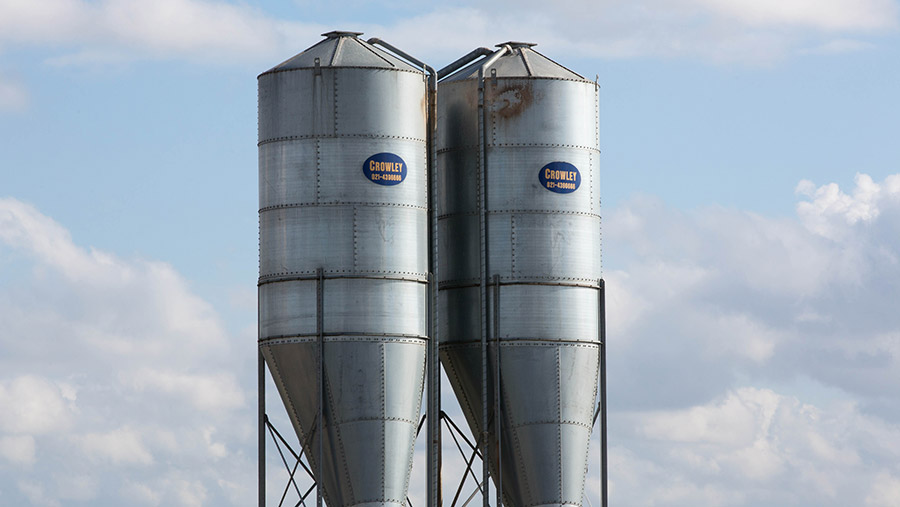Alternative forage options for dairy cows this winter
 Library pic © Tim Scrivener
Library pic © Tim Scrivener Dairy farmers facing a shortfall in forage need to react now and secure feed with prices and supplies of alternative feed options expected to worsen.
Already feed prices have gone up on average by 30% since the start of the year, with The Dairy Group (TDG) anticipating an increase in average cost of production of 10% to 34.5p/litre.
David Donaldson, national nutritionist with TDG, says it’s important cows continue to receive enough fibre to ensure a healthy rumen and to prevent acidosis. “If forage stocks are tight you may need to look at some forage replacers,” he says.
See also: How to act on drought and tightening forage stocks
Forage replacers
Options include moist feeds such as distillers’ grains, Trafford Gold, brewers’ grains and beet pulp and dry feeds such as palm kernels, wheat feed, nutritionally improved straw (NIS), straw and hay.
All of these alternative feed options have seen prices increase. Trafford Gold is all sold out, beet pulp has gone up to £220/t and soya hulls, which were good value at £160/t, have gone up to £180/t since the start of July.
Commenting on some of the alternative feeds, Mr Donaldson says: “NIS pellets are higher in energy than straw (6ME v 3ME) and have a good buffering action in the rumen.
“Other feeds such as sugar beet pulp and soya hulls are also great when fibre levels are low. Products such as Trafford Gold, (50% dry matter), when looked at on a dry matter basis, can be good value and contain much higher energy and protein compared with hay and straw.”
Mr Donaldson warns some liquids products can be expensive on a dry matter basis, but if the diet is lacking in sugar or protein, can be cost effective for cattle.
Feeds such as palm kernel, sunflower, and wheat feed, which are still reasonably priced and contain high fibre levels, could be an advantage with lower forage levels. Confectionary feeds can also be good value and contain more oil than palm kernel, sunflower and wheat.
“However, while this will increase their energy level, be careful to not overfeed as high oil levels can lower butterfats,” he warns.
Long chop fibre needs to make up 25-40% of the total dietary dry matter intake, says KW Feed ruminant technical manager Anna Sutcliffe. “If your forage stocks are less than this then you will need to buy in additional long-fibre.”
If straw is being used for bedding, Dr Sutcliffe suggests looking at alternative bedding options and using the straw in the diet. She also suggests preserving silage for the milking portion of the herd.
“When looking at alternative feed options it’s important you consult with a nutritionist,” she says.
Dr Sutcliffe suggests some example silage replacement options.
Silage replacement options
If you have a large shortfall in long-fibre you can replace 18kg of silage (28% DM) with:
- 3kg of straw and 6kg of Trafford Gold
- 3kg of straw and 14kg of brewers’ grains
- 4kg of straw and 5kg of spey syrup
- 4kg straw and 1.5kg of wheat feed and 2.5kg of a high protein and energy molasses-based liquid product
- 3kg straw 4kg wheat feed
If you have a small shortfall in long-fibre you can replace 2kg of silage with:
- 7kg of pressed pulp
- 9kg of brewers’ grains or draff
- 4kg of Trafford Gold
- 4-5kg of a moist blend (Wessex Gold)
- 2.5kg of maize gluten
- 2.5kg of a tailormade blend
- 2.5kg of wheat feed
- Soya hulls, sugar beet, palm kernel
- Home-grown cereal
Feed prices |
|||||
|
Straights prices |
Spot |
Spot |
Spot |
Forward |
Forward |
|
|
July 2017 |
July 2018 |
Change ( %) |
Aug-Oct 2018 |
Nov-Apr 2018 |
|
Hipro soya |
£275/t |
£335/t |
22% |
£336/t |
£330/t |
|
Rapeseed meal |
£188/t |
£225/t |
20% |
£225/t |
£230/t |
|
Maize gluten feed |
£146/t |
£200/t |
37% |
£190/t |
£185/t |
|
Wheat grain |
£145/t |
£165/t |
14% |
£170/t |
£175/t |
|
Price given is ex-store. On farm add £8/t, for wheat grain add a minimum processing charge of £8/t. Source: The Dairy Group |
|||||
